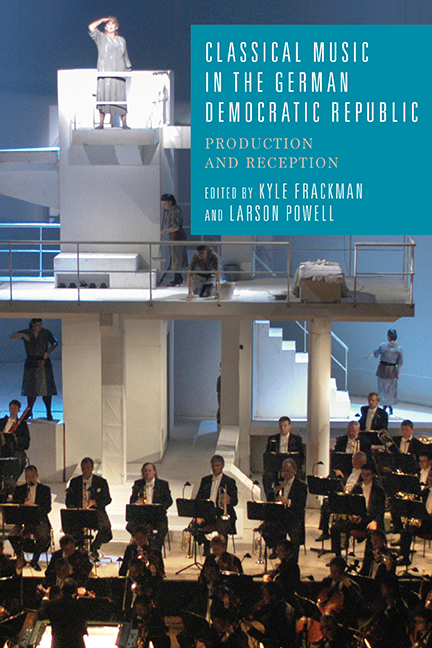Book contents
- Frontmatter
- Contents
- Acknowledgments
- List of Abbreviations
- Introduction: Music and Heritage in the German Democratic Republic
- 1 Provincialism, Modernity, and the Classical Heritage: The Administrative Structure of the GDR and the Situation of Music Production
- 2 Classicism as Anti-Fascist Heritage: Realism and Myth in Ernst Hermann Meyer’s Mansfelder Oratorium (1950)
- 3 Positioning Georg Knepler in the Musicological Discourse of the GDR
- 4 Ehrt euren Deutschen Meister: Reproducing Wagner in the GDR
- 5 The Embodiment of Collective Memory in Neue Odyssee
- 6 Marxism and Feminism in Ruth Berghaus’s Staging of Don Giovanni
- 7 Beyond the Gewandhaus: Mahler and the GDR
- 8 Hanns Eisler’s Funeral and Cultures of Commemoration in the GDR
- 9 Exile—Remigration—Socialist Realism: The Role of Classical Music in the Works of Paul Dessau
- 10 “What a Satisfying Task for a Composer!”: Paul Dessau’s Music for The German Story (. . .Du und mancher Kamerad)
- 11 Friedrich Schenker and the Third Way
- 12 A Prism of East German Music: Lothar Voigtländer
- Notes on the Contributors
- Index
12 - A Prism of East German Music: Lothar Voigtländer
Published online by Cambridge University Press: 21 May 2021
- Frontmatter
- Contents
- Acknowledgments
- List of Abbreviations
- Introduction: Music and Heritage in the German Democratic Republic
- 1 Provincialism, Modernity, and the Classical Heritage: The Administrative Structure of the GDR and the Situation of Music Production
- 2 Classicism as Anti-Fascist Heritage: Realism and Myth in Ernst Hermann Meyer’s Mansfelder Oratorium (1950)
- 3 Positioning Georg Knepler in the Musicological Discourse of the GDR
- 4 Ehrt euren Deutschen Meister: Reproducing Wagner in the GDR
- 5 The Embodiment of Collective Memory in Neue Odyssee
- 6 Marxism and Feminism in Ruth Berghaus’s Staging of Don Giovanni
- 7 Beyond the Gewandhaus: Mahler and the GDR
- 8 Hanns Eisler’s Funeral and Cultures of Commemoration in the GDR
- 9 Exile—Remigration—Socialist Realism: The Role of Classical Music in the Works of Paul Dessau
- 10 “What a Satisfying Task for a Composer!”: Paul Dessau’s Music for The German Story (. . .Du und mancher Kamerad)
- 11 Friedrich Schenker and the Third Way
- 12 A Prism of East German Music: Lothar Voigtländer
- Notes on the Contributors
- Index
Summary
AS A PRELIMINARY POINT I would like to clarify the relation between music and musicology. Although I am personally acquainted with the composer Lothar Voigtländer (b. 1943) and he provided me with extensive material for my essay, the text itself was always based on listening to, analyzing, interpreting, and critically evaluating the music long before consulting the composer's own statements. Several apologias and misinterpretations in scholarship caused by following such statements all too closely—for instance in the cases of Richard Wagner, Arnold Schoenberg, or Karlheinz Stockhausen—have proven that scholarship must remain independent at all times. Some pieces by Voigtländer do not appeal to me. Most do, however, so much so that I consider it worthwhile to highlight them. This is particularly needed since only a few anthologies provide recordings of Voigtländer's shorter compositions and none do of his longer ones, with the exception of Visages— KammerSzenario in 8 Teilen nach Texten von Eugène Guillevic (2003), which I will discuss below. Voigtländer's immediate musical context in the GDR is documented on vinyl records, which are still difficult to obtain despite their current renaissance. In order to adequately appreciate Voigtländer, particularly in the context of GDR music history, one depends inevitably on vinyl, even though in the meantime some music has been reproduced using other recording devices.
East German Neue Musik (New Music) differs from its Western counterpart in an important way. In the West, the analytical and reflective work of musicologists may seem virtually unnecessary, considering the composers’ often frank self-disclosures regarding ideology and techniques of composition. Furthermore, as opposed to the historians’ focus on political parameters, the GDR's New Music asks for one thing in particular, like almost every kind of art music: namely, an awareness of its rational and irrational emotive forces, its respective cultural and educational horizons, as well as its autonomous status as art.
Origin
Although it seems natural to analyze the GDR's New Music with a central focus on its political conditions, such an approach would pass over this music's main intentions, that is, to be recognized as art beyond the temporal confines of the GDR's existence.
- Type
- Chapter
- Information
- Classical Music in the German Democratic RepublicProduction and Reception, pp. 241 - 256Publisher: Boydell & BrewerPrint publication year: 2015

